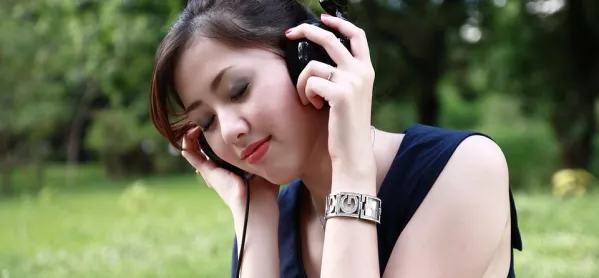I was covering a Year 9 PE lesson.
I didn’t have to do anything as such, but they needed an adult in the room while the students used the gym equipment.
The PE teacher set up the session and was just about to leave when one of the girls asked if they could listen to music.
The teacher said yes but very firmly pointed out that there was to be no music with obscenities of any kind. The girls agreed and one of them plugged her iPhone into the speaker at one end of the room.
An ear-opening experience
For the next hour, I was like one of those friends, given one earphone, so I could hear the music they liked. It was a revealing experience.
Just as they’d agreed, there was nothing explicit. And yet, track after track poured out a steady stream of low-level sexism, eye-watering materialism and the occasional implicit threat of violence.
It really got me thinking. Music is so powerful, for all of us, but especially for young people. It affects emotion and it shapes identity.
But, as teachers, we don’t often talk to young people about this power.
Part of the reason for this may be that we tend to think of music as having only a positive effect: to entertain, relax, motivate, and focus.
But, like anything with such power, music can be used for good or for bad. It can be used to deepen negative thoughts and feelings.
Musicking
This is not about telling young people to put on an uplifting track to cheer themselves up, or to stop listening to lyrics with questionable values. It’s about helping them understand some of the complexities of music so that they can use it more skilfully.
There’s even a word for this in psychology - musicking: this is the active use of music with a specific intent.
And, when you break it down, there are lots of different things that we use music for, often without realising it.
Perhaps the most obvious use of music is to affect our emotions but, even here, there are lots of different ways we do this.
It might be to pump ourselves up, but it can also be to calm ourselves down. It could be to help let go of bottled-up emotions, but it can also be to intensify an existing emotion.
Then, there’s using music to enhance emotional self-awareness. Often this is as much about the lyrics as the music.
Hearing someone else articulate emotional experiences that resonate with you helps you to reflect on your own experiences and clarify them. And realising that someone else has gone through the same thing as you is deeply comforting.
But lastly, there’s identity. Music can help young people to think about who they are and who they want to be.
Identity and control
That’s because listening to music is a kind of space where young people can feel in complete control. Homelife may be difficult, school might be a place where you have to fit in, but your music is all your own.
That gives it a kind of safety, where young people can play out different versions of themselves, trying out different identities and seeing what fits.
Of course, it’s not just individual identity - music offers up all kinds of social identities which help young people to feel connected to others. Music offers young people a family that they get to choose.
Once young people are made aware of these things, they can be encouraged to use music more mindfully.
That means thinking about what they want to use their music for - to affect an emotion, to clarify complicated experiences, to figure out who they are and connect with others.
And it means noticing the effect a piece of music is having.
Realising that a song that brought you comfort yesterday (when you were relaxed) is not working the same way today (when you’re anxious).
It also means being open to using different types of music, to see if they work for you.
Because, sometimes, repeated use of just one kind of music might be the sign that you’re stuck in a kind of identity loop, unable or unwilling to move forward and develop as a person.
Aidan Harvey-Craig is a psychology teacher and student counsellor at an international school in Malawi. His book, 18 Wellbeing Hacks for Students, is out in August. He tweets @psychologyhack




